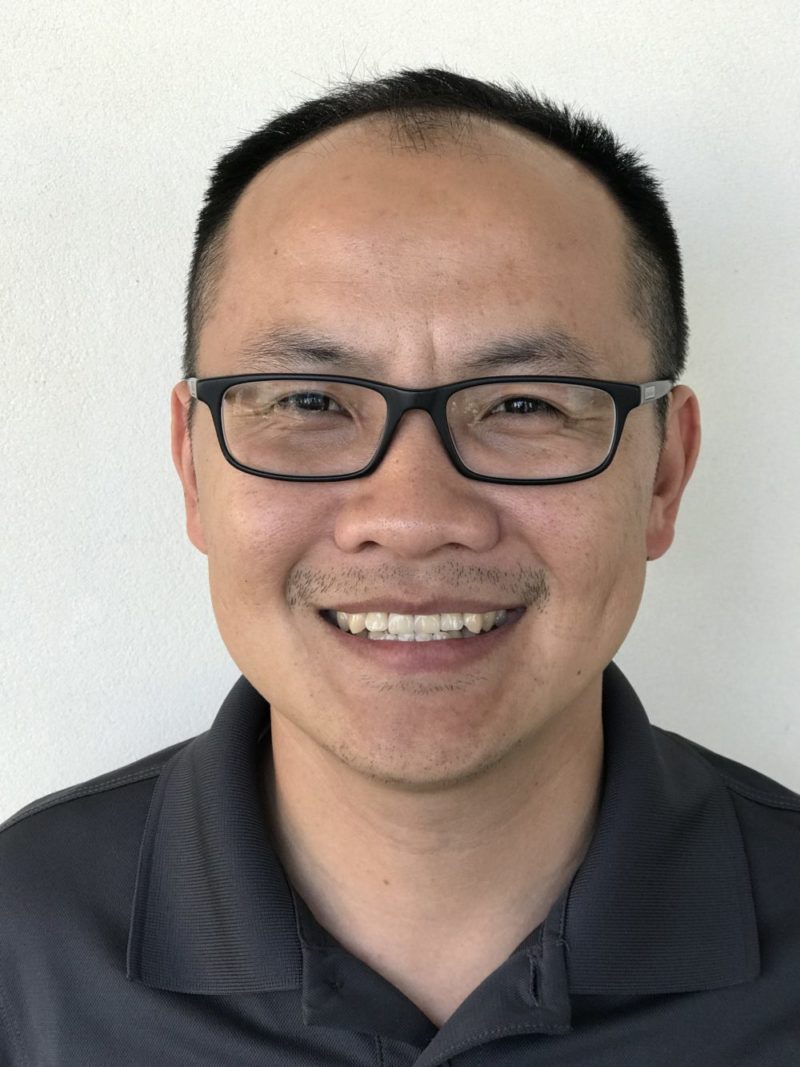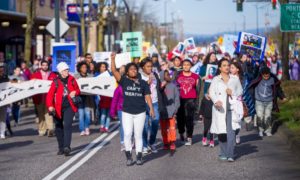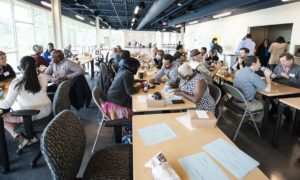Fresno is in the middle of the desert. The summers are hot. The average temperature in September is 93 degrees.
On this September day, I had scheduled a meeting with one of my Fresno Boys and Men of Color (BMOC) youth leaders to prepare him to facilitate an upcoming meeting. I usually give him a ride to the office, but on this day, he took the local bus.
When he arrived, it was clear that he had been affected by the heat. He was sweating. Beads of perspiration rolled down his forehead. He looked and sounded exhausted as he started to tell me about his bus ride to the office, which was a little more than two miles from the community college campus.
Where he waited for the bus, there was neither a bus shelter nor nearby natural shade. The bus was late, so he was at the mercy of the heat and sunlight for a long time.
He doesn’t take the bus often, but knows others who rely on the bus and ride it regularly. He saw the connection between his experience and theirs: This is what regular riders experience day in and day out. He decided he wanted to do something about it.
Igniting the Fire for Change
That’s how the bus campaign began — and it is a prime example of how most campaigns at the Youth Leadership Institute (YLI) are launched: with a fire for change that is ignited by a young person’s personal experience.
It only makes sense. Contrary to conventional wisdom, youth are tuned into what’s going on around them and they care deeply about what’s happening in their communities. They have access to spaces within their communities that adults may not have, and navigate the world differently than adults. Because they have unique experiences and understandings of how the world works, they are less entrenched and can bring new ideas to the table. When adults are willing to listen, youth stories and actions can capture hearts and minds in ways that adult stories cannot.
This conviction — that youth can make invaluable contributions to social justice efforts — is at the heart of YLI’s youth-led advocacy approach. Our job as adult allies is to provide the tools for young people to think critically about and propose solutions to the issues within their communities — and then to work with them to advocate for policy change.
YLI’s program work thus begins with helping our young people to develop critical consciousness by offering them frameworks to think about and articulate their experiences, and safe space to discuss their ideas and opinions. In the process, they begin to connect their personal experiences with larger social justice issues, and identify the issues in their communities they most care about. They also build trusting relationships with peers and adult allies, and confidence in their own voices.
Building a Campaign

Sher Moua
Since that first day, this young person and his BMOC brothers have been driving the campaign, with the goal of increasing frequency of service where there is high ridership during peak hours. Their first step was to gather more information about the issue. They took the bus from south Fresno to north Fresno and started conversations with riders.
They found that their brother’s instinct was on point: Stops lacked basic amenities, like a shelter, a bench or a garbage can. Buses didn’t run on time and rides were long — it took nearly an hour for one group to travel from north Fresno to south Fresno. It was also clear that the bus issue disproportionately affected low-income communities and people of color, and that these were the voices that needed to be elevated and to be heard by transit authorities and the city of Fresno. These are the people who are using the bus to get to work, to school and to move about the city.
Digging deeper, they discovered that Fresno Area Express (FAX) was in the process of developing a plan to make improvements to public transportation in the city. FAX had already held seven workshops in diverse Fresno communities to collect community input. BMOC youth decided to attend the final workshop to learn more about the process. From the data shared, it was clear that transit authorities had not been speaking to people who ride the buses — of the 87 individuals who had attended the previous workshops, the overwhelming majority had been white, with an average income of over $100,000 a year.
They decided to conduct a survey to collect their own data on community public transportation needs. Two key issues that emerged were bus frequency at high-volume bus routes and the lack of Wi-Fi. They found that some buses, full of passengers, would simply skip stops. Long bus rides to and from school or work are missed opportunities to get work done, and young people often need to reach out to family to let them know where they are.
Based on this research, our BMOC and Womxn Empowered youth leaders are advocating for Wi-Fi access and higher frequency, reducing the proposed 30-minute interval to 15 minutes where there is high ridership during peak hours. They have met with FAX representatives and elected officials to present their research findings, share their personal stories and offer recommendations for improving the plan. City Council is scheduled to vote to adopt the plan this spring.
Invaluable Contributions
Throughout, the role of adult allies — of YLI staff and our partners, Fresno Barrios Unidos, Fresno Interdenominational Refugee Ministries, Womxn Empowered and Fresno Building Healthy Communities — has been to position our young people and provide them with the right tools to succeed. This includes:
-
- Listening to youth concerns and encouraging them to do something about it. This may seem like a small and obvious step, but it simply cannot be overstated. Many well-meaning organizations squash opportunities for youth leadership development right from the get-go — and miss invaluable insights from young people, who know better than anyone else the issues that most impact them — by dictating what issues youth should work on. The sense that adults are truly listening — that youth opinions and ideas matter — is the essential first step in developing critical-minded, empowered young people.
- Providing a social justice lens. Young people are very aware of the world they live in and the issues that affect them. Adult allies can support them to understand their experiences within the larger context of social inequities. Youth-led action research is an incredible way to help young people formulate and answer their own questions about the social injustices they experience.
- Giving youth the resources and tools they need to implement actions. Young people are often idea-rich, but resource-poor. They rely on adults for transportation, for spaces to meet and for an array of other tools to implement their ideas. Positive forms of guidance point young people in the right direction by sharing effective models and strategies, giving them space to create their own solutions.
- Connecting youth with decision-makers. One of the key values young people bring to social justice movements are their voices. Their stories can be deeply compelling, and putting them in front of decision-makers is a powerful strategy for making change. Getting a foot in the door can be a challenge for young people, however, as many adults underestimate their value. Adults can help connect young people to elected officials and community leaders to ensure their voices are heard.
Authentic youth-adult partnerships mean recognizing and valuing the role that each party plays. Where adults bring resources, life experience and networks, young people contribute their compelling stories, fresh perspectives and innovative solutions. We provide them with the space to meet; they come up with the bright ideas for change. We provide them with the tools; they conduct the research and build the campaigns. We connect them to the elected officials; they present their findings and tell their stories. We take them to City Hall; they win policies on behalf of our entire community.
The result? So much more than the practical ins and outs of implementing a campaign for both parties: We learn that the voices of young people are integral to social justice movements, and that, together, we have the power to make a real change on behalf of our communities.
Sher Moua is the program manager for Fresno Boys and Men of Color, which is a community of young leaders who heal, advocate and serve to make a healthy home for all. Fresno BMOC is the youth leadership component of Fresno Building Healthy Communities and is coordinated by Youth Leadership Institute. Moua has a B.A. in anthropology from UC Berkeley and an M.A. in education from Long Beach State.





























